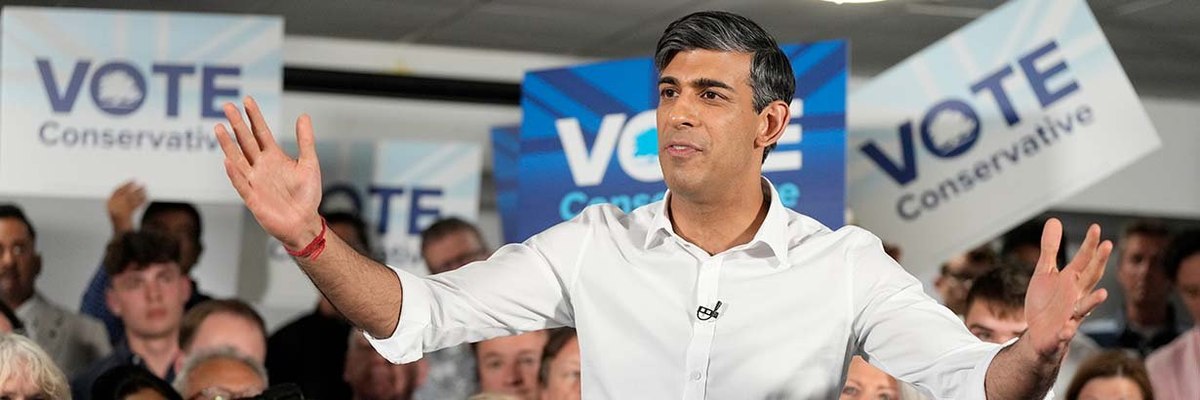Will Tory waverers and Reform UK defectors come back to the party?
As the election campaign progresses, the Conservatives will be looking for something, anything, to suggest that their fortunes are going to turn.
So far the polls have not obliged. Labour’s lead has remained stubbornly high, and what looked to be a potential recovery in Rishi Sunak’s personal popularity has since subsided.
Twice so far this election YouGov has asked voters to what extent they’ve made up their mind if and how they will vote. In both polls, the results have been virtually identical.
Four in ten Britons (43%) picked the most emphatic option, saying they have made their mind up and are not going to change it. A further 23% say they’ve probably decided their vote, and are unlikely to change their mind. One in six (18%) say they have a good idea if and how they will vote, but there is a possibility that they will change their mind.
Then, finally, there is the classic debate of who is more indecisive – the 7% of Britons who say that it’s as likely as not they’ll change their mind on whether and who to vote for, or the 10% of people who just flatly answered “don’t know”.
Those who intend to vote Conservative or Labour have almost identical views. Most in both groups (57-58%) say they have made up their mind and won’t be deterred. A quarter (25-28%) have probably decided and are unlikely to change their minds, around one in eight (11-13%) have a good idea how they’ll vote but could possibly change their minds, and 3-4% say they’re as likely as not to change their mind or don’t know.
Voters for minor parties are notably less certain about who they will back. More than four in ten who intend to vote Reform UK (45%) or Lib Dem (44%) say they have made up their mind entirely, as do 35% of Greens.
What hope do the Conservatives have of bringing back Reform UK voters?
One of the key reasons the Conservatives are performing so poorly in the polls is because they have haemorrhaged voters to right wing challenger party Reform UK. In the latest voting intention survey (29-30 May), fully 21% of those who voted Conservative in 2019 say they now intend to vote for Reform.
Conservative hopes of winning the election, or at least, mitigating their losses, are pinned on being able to convince significant numbers of Reform UK voters to switch just ahead of the vote. So how feasible does that look?
The answer is, not very. Fully 43% of those who intend to vote Reform UK rate themselves a ‘0’ in terms of their likelihood to consider voting Conservative – if we expand this to include all who gave themselves a score of less than ‘5’, this figure increases to 66%.
Looking specifically at those Reform UK voters who had backed the Conservatives in 2019, we still find that most (57%) rate themselves 0-4 in terms of likelihood to vote for the Tories.
And the large majority of Tory defectors to Reform UK seem unlikely to change their minds – 45% say they have totally made up their mind and won’t change it, while a further 31% say they’ve probably decided and are unlikely to wobble. This leaves 21% who say it is “possible” they will change their mind, but only a mere 3% who say they are on the fence or don’t know what they will do.
Given that other recent YouGov survey research shows that Reform UK voters are extremely animated by immigration – 82% say it is one of the most important issues to deciding their vote, and 68% say it is THE most important issue to their vote – coupled with the fact that immigration is the issue that the public think the government are most likely to be handling badly (at an enormous 84%), it seems unlikely that the Conservatives are going to be able to bring many of their Reform UK defectors back.
Will 2019 Conservative don’t knows return to the party?
Another key group for the Conservatives are their own wavering voters from the last election. According to the most recent voting intention survey, 18% of those who backed the party in 2019 are still unsure who they will vote for.
While the expectation is that many of these voters will return to the party come the election, Tories cannot take anything for granted given their low approval ratings.
It does appear likely that most of these voters will turn out for the election – 47% of 2019 Conservative ‘don’t knows’ rate themselves a 10/10 in terms of likelihood to vote, rising to 63% giving a score of 8 or more. Only 6% score themselves below a 5/10.
On the question of to what extent they’ve made up their mind on who to vote for, 38% of 2019 Tory ‘don’t knows’ say they have a good idea of their vote, but may possibly change their mind, while 29% say it’s as likely as not they’ll change their mind, and 25% answered a straight “don’t know”.
Given these voters are contemplating their options, it seems fair to say that a score of 5/10 or higher on willingness to consider a given party means that that party is in contention.
Using this categorisation, we can suggest that 60% of 2019 Conservatives who currently don’t know how they will vote are considering the Conservatives once again. A third are considering Reform UK (36%), a further third are considering Labour (34%), and 24% the Lib Dems.
Crossing these results shows the largest portion of unsure 2019 Conservatives are indeed more likely than not to favour the party over its main competitors. In the case of Reform UK and Labour, 40% of Tory waverers give a higher score to their willingness to vote Conservative than to back the other party, rising to 47% for the Lib Dems.
Only 9-15% suggest they are more likely to back an opposing party, and 9-17% are equally likely to vote Conservative as they are the other party. A further quarter (23-24%) seem to be unlikely to vote for either party in the comparison, giving a score of between 0 and 4 to both.
Thus it seems like the Conservatives have a good chance of returning a sizeable portion of their former voters back into the fold by 4 July. But with the party more than 20 points behind in the polls, it is hard at present to see where the votes are coming from for them to avoid defeat.
What do you think about the Conservatives' chances of winning, the coming election, and everything else? Have your say, join the YouGov panel, and get paid to share your thoughts. Sign up here.
Photo: Getty










